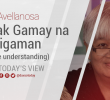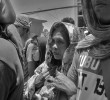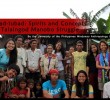(Last of two parts)
When it comes to the problems of the Moro people, the only solution that the Aquino administration can give is reform the Autonomous Region in Muslim Mindanao (ARMM), a name carried on by the civil society that pushed for President Aquino’s appointment of Mujiv Hataman as Officer-In-Charge in the ARMM. For lack of anything to report good about the conditions of the Moro people in his third State of the Nation’s Address, President Aquino turned everyone’s attention to the reforms made by his appointee in the ARMM highlighting the expose but not totally ridding the Department of Education-ARMM of reported ghost teachers and schools.
Reforms, though, has not lifted the poor conditions of our Moro brethren. According to the National Statistical Coordination Board, 36 percent of the poor people live in Mindanao, ranking second in the list of poorest regions is the ARMM (38.1 percent) and next to it is Zamboanga Peninsula (36.6 percent) which also comprises predominantly Muslim municipalities. The government is also not reforming its anti-terror laws and campaigns which have produced more than 500 arrested Moro men implicated as Abu Sayyaf members in exchange for hundred dollar rewards under the US government’s Rewards for Justice Program. At present, there are 248 Moro detainees, 24 of them belonging to the Moro Islamic Liberation Front (MILF) and the Moro National Liberation Front (MNLF) who were charged with common crimes instead of political offenses. The Moro communities continue to experience militarization and bombardment because the Aquino administration has not lifted the state of emergency and lawlessness ordered by the previous administration, and because of Aquino’s continuing All-Out Justice Campaign against the “lawless elements” in the MILF.
I remember during my days as the national president of the National Union of Students in the Philippines (NUSP). In one of our assemblies, newly released political prisoner Rafael Baylosis gave a talk about the difference between reforms and reformism. At that time, NUSP was in a debate with Congress about the resolution on the Magna Carta for Students. Baylosis reminded us the context of calling for reforms in the government, and how it is different from believing that all our problems will be solved by mere reforms.
According to Misuari, armed struggle remains an option for the MNLF should they fail to get the end of the bargain in the final peace accord. I hope that this is not a mere leverage used against the government for a piece of reform. So many lives have been lost for the struggle of the Moro people for the defense of our land and our aspiration for right to self-determination. I believe that a mujahideen and mujahidat’s aspirations go beyond the ARMM or any autonomous entity that will only serve to enrich the few at the expense of the Moro toiling masses and their communities.
I remember in history the reason why Moro intellectuals in the 60’s joined Kabataang Makabayan and in the 70’s formed the MNLF. It is to rise up to the calls of our Moro brethren who were oppressed by the Philippine government — a government that they called a puppet of the United States government. We cannot ignore the plea of our people to liberate them from oppression and tyranny.
MILF chairman Murad’s prayer is to “never to see again refugee camps crammed with old folks, women and children wallowing in squalor and misery, as well as never again witness the recurring wholesale violation of human rights that comes with oppression…” I believe this is what they have in common with the MNLF and the National Democratic Front of the Philippines and the Communist Party of the Philippines (CPP) which stated in their October 17 statement their support and trust “that the Moro revolutionary forces will continue to steadfastly hold on to the victories which they have gained through armed resistance.” The CPP is encouraging the “Filipino and Moro people to rally around the cause of Moro self-determination and push the peace negotiations to favor the Moro people and oppose the duplicity and maneuverings of the reactionary Aquino regime.”
The Moro people should not succumb to President Aquino’s “daang matuwid” for it reeks of policies favorable to the few elite. It is very different from the “straight path” (ṣirāṭa al-mustaqīm) that we Muslims forever take in heart while we recite the Sūratul-Fātihah (The Opener or Beginning of the Noble Qur’an). In the context of the Moro people aspiring for meaningful change, the path is towards right to self-determination is the liberation of our people from oppression.
Read the first part here.
Amira Ali Lidasan is an Iranun and hails from a prominent Moro clan in Maguindanao. She is an observer of Moro politics and an activist. Write to Amira at amirah.lidasan@gmail.com.
Views and opinions expressed in this column are solely those of the author and do not necessarily reflect the opinions of Davao Today.


![[STANDPOINT] Illegal drugs and the NIMBY mindset](https://davaotoday.com/wp-content/uploads/2016/09/Mags-Maglana_UPMIN-Sept.-20-110x100.jpg)








